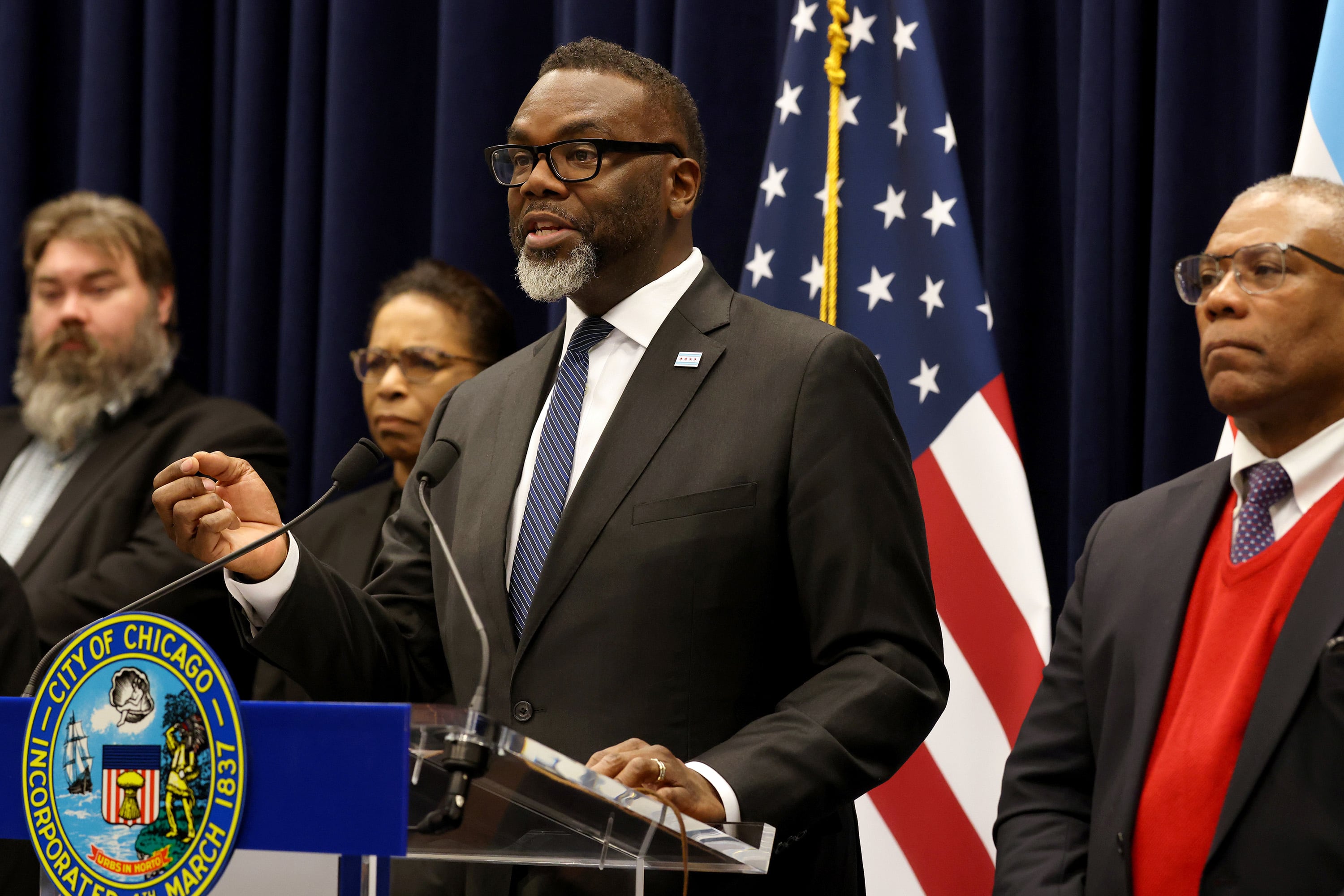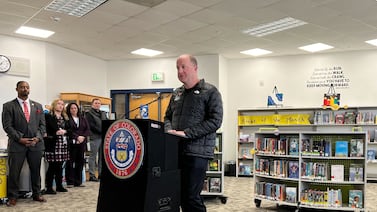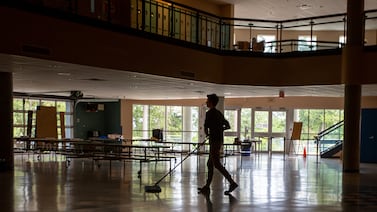Mayor Brandon Johnson taught for four years at Chicago Public Schools before going on leave in 2011 to work for the Chicago Teachers Union and ultimately launch a career in politics.
But even though he no longer works for the union, Johnson remains on “union leave” from the school district.
That means, after all these years, he could return to the classroom — and earn a six-figure salary as if he never left.
The mayor’s leave status has attracted more scrutiny and concerns about a potential conflict of interest in recent weeks, as his administration negotiates a contract with the CTU that could benefit him in the future. Those negotiations have become increasingly tense and have fueled a monthslong leadership shakeup at CPS, including the recent firing of CPS CEO Pedro Martinez.
Under CPS policy, Johnson — or any CPS employee who leaves to work for the union — can accrue seniority during their time away and return to CPS with the guarantee of a job.
In an interview with Chalkbeat on Tuesday, the mayor said he hasn’t thought about what he would do after his time in office but said teaching middle school “is still the best job I’ve ever had.” He denied that his union leave status represents a conflict of interest, because he’s not currently earning a CPS paycheck.
“There’s no economic benefit for me as a CPS employee on leave as mayor of the city of Chicago,” Johnson said. “We have firefighters who are on leave, right, [on the] City Council, and they actually vote on their contracts. There are police officers who are on leave and they actually vote on those contracts. I don’t vote on any contract, so there’s no conflict of interest.”
Ald. Nick Sposato, who represents part of the city’s Northwest Side, said he was on leave from the Chicago Fire Department for his first eight years in office and voted on firefighter contracts. During that time, he did not feel conflicted because council members were not directly involved with bargaining.
“Nobody ever had a problem with me being a fireman and voting on fire contracts,” Sposato said.
Sposato, who is occasionally critical of the mayor, also said he did not believe Johnson would “give the farm away” for personal gain years from now.
“I believe he’s a man of integrity,” he said of Johnson.
Until 2027, Johnson will appoint a majority of members to the Board of Education, who will vote to approve union contracts and allocate money to pay for the costs.
On Christmas Eve, an internal CPS memo included in Martinez’s legal filings against the Chicago Board of Education documented concerns about Johnson’s employment status with the district. The memo was first reported on by the Chicago Tribune. In that June 2023 memo, Ben Felton, the chief talent officer for CPS, wrote that he was concerned about a potential conflict of interest due to the mayor’s ongoing employment with CPS, an organization that he oversees.
Felton wrote that he raised the issue with then-Deputy Mayor of Education Jen Johnson, who is not related to the mayor, on four occasions between May and June 2023. The mayor declined to resign his position because he wanted to “signal his support for education and teachers,” Felton wrote in the memo.
Johnson, who remains a close CTU ally, repeated that sentiment Tuesday.
“I’m committed to making sure that the people who do teach, the people who are in our schools, that they know that they have an advocate … and to ensure that our public schools and our public teachers are fully supported,” Johnson said.
If Johnson were to return to his CPS job, he would at minimum be placed in the district’s Reassigned Teacher Pool and assigned to a school, according to Felton’s memo. Felton added that he felt the mayor’s return to CPS “is unlikely,” but that his leave status was “not an immaterial benefit.”
Dick Simpson, professor of political science at University of Illinois at Chicago and a former alderman, said no mayor in recent history has been in Johnson’s position. But he said the economic benefit to the mayor “is not substantial enough” to be deemed a conflict of interest.
“If he becomes involved in the negotiations and the running of the schools, which many mayors like Richard M. Daley did or Richard J. Daley before him, the question is whether or not his own history and involvement will cause him to make decisions which are bad for the city or in this case, the school system, or both,” Simpson said.
The mayor’s office has pushed CPS to take out a short-term loan to help pay for the costs of a new labor contract with the CTU and the principals union, as well as to cover some pension obligations. Martinez has refused to take that step — one of the factors that led to his firing.
Other observers see things differently.
“If he has no plans to go back, he should easily resign” from CPS, said Vladimir Kogan, professor of political science at Ohio State University who has studied local politics and education policy. “I think this is a problem of his own creation.”
Joe Ferguson, Chicago’s former inspector general who now leads the Civic Federation, a government watchdog group, said it’s unclear whether the mayor’s employment status and his official position cross legal lines.
“It impels a much greater degree of transparency and public facing disclosure of his actual activities, communications, and positions, so that there is no question of where he is acting in conflict with his former employer, and there should be a reassessment of the law and regulations,” Ferguson said.
Johnson could earn over $100,000 upon CPS return
If Johnson went back after his first term in office, in 2027, he would be considered a 20th-year teacher, even though he taught for just four years before his 2011 departure. These details were not mentioned in Felton’s memo.
That means, according to the current CTU contract, that Johnson could earn at least $100,419 upon his return. That figure is the base salary for a minimum 208-day schedule and doesn’t include other benefits. It does not account for raises or changes to salary brackets that could change in the next contract. Chalkbeat was unable to verify the salary “lane” Johnson was in before he left CPS. These lanes change a person’s salary based on factors like earning a master’s degree. Johnson has a master’s degree in teaching, according to his biography.
The salary figure represents someone who has worked for 20 years and is in the lowest lane; someone in the highest lane would earn a base salary of just over $113,300, under the current union contract.
CPS has offered annual raises of between 4% and 5% for the new contract.
After Felton raised concerns about the mayor’s employment status to former Deputy Mayor Jen Johnson, she said she asked the city’s ethics adviser about the issue and that the adviser “did not have concerns,” Felton’s memo said.
Chalkbeat filed an open records request with the Chicago Board of Ethics for any official advisory positions about the mayor’s employment status; the board said no such records existed.
After this story published, Steve Berlin, executive director of the ethics board, told Chalkbeat in an email that “neither the staff of the Board of Ethics nor the Board itself was asked about leave arrangements, and have issued no opinions addressing this issue.”
One former senior CPS official, who spoke on condition of anonymity to discuss personnel issues, said that the mayor, CPS, and CTU should all know that Johnson no longer qualifies for being on union leave due to his departure from CTU, and act accordingly by working to change his employment status.
In response to questions from Chalkbeat, CPS spokesperson Mary Ann Fergus said, “CPS flagged this area of concern as outlined in the Chief of Talent Ben Felton memo. It is presumed that the mayor determined that no action was necessary.”
At the same time, the former official acknowledged, Johnson’s position as the most powerful elected official in the city — and technically as the boss of CPS — can make it intimidating for members of his own administration to take action without his consent, especially if he’s expressed his desire to stay on leave, he said.
“It’s the mayor’s responsibility and his team’s responsibility to identify that this is an issue and take action about it,” the former official said. “And they were presented baldly with the choice, basically, and said, ‘No.’”
Becky Vevea contributed reporting.
Reema Amin is a reporter covering Chicago Public Schools. Contact Reema at ramin@chalkbeat.org.
This story includes an updated response from Chicago Board of Ethics Executive Director Steve Berlin.






